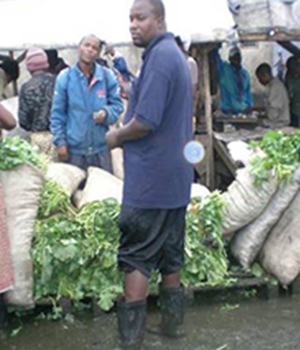Many of the solutions we have identified will help farmers grow more especially in the dry season. But there is little point in a farmer increasing their productivity if there is no market for their produce.
Equally, many poor farmers have limited access to information about market prices, which items are most in demand and when is the best time to sell.
Add to this the fact that most farmers have difficulty finding accurate information and advice on what machinery or materials would make most sense, and it becomes clear that there is plenty of scope for helping farmers simply by improving information and offering support with marketing.
[row][column size=”2/5″ center=”no” class=”LightBlueBackground”]
Improving the Supply Chain
Duty and VAT rules are hazy and farmers find it difficult to locate a reliable supplier who can tell them what they need to know. For a smallholder with limited funds, buying a pump is a major investment. Clarifying the regulations around taxation and improving the supply chain could make a big difference.
In Zambia, the recommendation is to encourage farmers’ groups to negotiate good terms with dealers.
In Ghana, the pump supply chain is not well developed and 76% of farmers reported that they had problems in finding the type of pumps they needed. Those on sale are sub-standard quality and often farmers scrap them because of minor defects and buy new ones.
In Ethiopia, the research suggests finding ways to support businesses in selling a variety of pumps and in providing after-sales service and parts. Businesses that cover the entire chain, including the sale of farm produce, may also overcome the problems that farmers face with market traders (see Markets below).
Zambia – Duty Waiver Ghana – Motor Pumps Ethiopia – Motor Pumps
[/column] [column size=”3/5″ center=”no” class=””]

Helping Farmers Access Markets
It is common for markets to be controlled by middlemen who dictate the prices farmers can get for their produce. Many farmers are disadvantaged because they don’t have sufficient knowledge not just on pricing, but on which crops they could be growing to get the best prices.
Tightening regulations around markets and communicating information to farmers will benefit many and help them earn a fair price for their crops.
In Lusaka, Zambia, the project found that brokers control the market and there is no official market information system. Solutions here include developing a legal framework and setting up a market information system.
In West Bengal, building cold storage units would help farmers who grow perishable crops in the dry season.
[/column][/row] [note note_color=”#ffe4c6″ text_color=”#000000″ radius=”1″]Outgrowers
When all the parties work together in good faith, outgrower schemes can offer a promising model for smallholder farmers.
Multinational agribusinesses and large supermarket chains are making increasing use of smallholders to secure their supplies. Donors are also showing interest and offering support for establishing schemes and associated farmers organizations.
But is this a suitable model to improve access to water and incomes for poor men and women farmers or is it simply an option for the better off?
One of the most important things for a smallholder is a guaranteed market for their produce. Many outgrower schemes go beyond that, offering farmers access to water, irrigation technologies, inputs, and extension. In return, the smallholder agrees to sell their produce to the company at a fixed rate, often minus a percentage to cover the company’s costs.
[/note]







